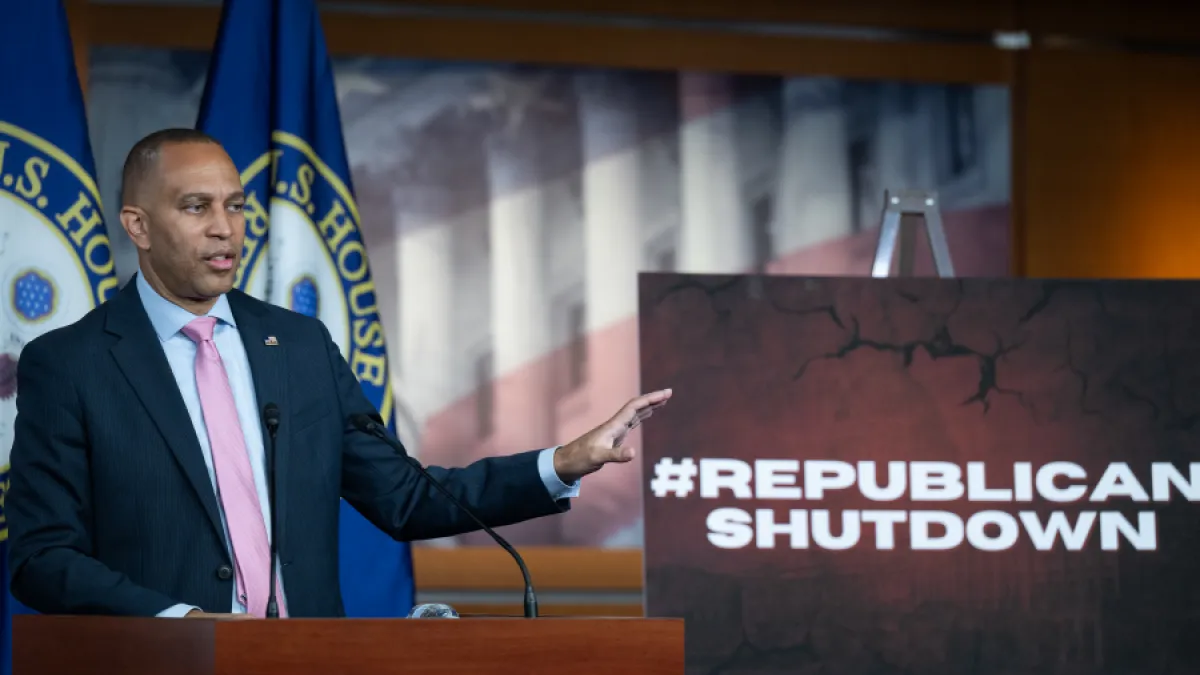
Federal agencies will be forced to shut down on October 1 unless lawmakers can reach a deal to extend federal funding. House Speaker Mike Johnson and House Minority Leader Hakeem Jeffries on Tuesday each laid the responsibility for avoiding a shutdown at the other’s feet.
With the fiscal year coming to an end on September 30, lawmakers will be scrambling this month to provide funding for the federal government, either through annual spending bills or, more likely, a continuing resolution that extends current funding levels.
On Tuesday, Jeffries repeated his warning that House Democrats would oppose any GOP spending bills that are purely partisan and do not include their input.
“The ball is in the court of the Trump administration and Republicans, because if they continue to proceed down the lane of trying to jam a partisan bill down the throats of the American people without working with Democrats in the House or the Senate, our position will be the same as it was in March,” Jeffries told reporters, referring to the showdown over government spending this past spring, when House Democrats voted against a continuing resolution plan put forth by Republicans.
He added that he had spoken with House Speaker Mike Johnson about the issue last week and “made clear we’re not going to support partisan funding legislation. Period. Full stop.”
Democrats in the Senate took a different approach in March. Nine Democrats and one independent voted in favor of the Republican spending bill that had squeaked through the House, providing enough support to push the legislation through Congress. Senate Minority Leader Chuck Schumer may face the same situation in the coming weeks, forcing him to weigh the political costs and benefits of a government shutdown in October.
In a letter Tuesday, Schumer indicated that he and Jeffries are more aligned now. “The only way to avoid a shutdown is to work in a bipartisan way, with a bill that can get both Republican and Democratic votes in the Senate,” Schumer wrote.
Johnson told reporters that Democrats will have to decide whether to allow a shutdown or not. “The ball will be in their corner,” the speaker told reporters Tuesday, adding that House Republicans have been advancing annual appropriations legislation. “We do not believe it’s in the nation’s interest to close the government down,” he said. “So if Schumer and the Democrats have that in mind, I think that’s deeply regrettable.”
Johnson also insisted that Republicans would not agree to roll back the health care cuts they passed as part of their megabill as a way to get Democrats to cut a deal on the current spending bill.
The White House reportedly indicated on Friday that it prefers a “clean” CR — which would continue Biden-era spending levels from 2024 — while gambling that Democrats won’t oppose such a measure or would bear the blame for a shutdown if they do.
“It’s very hard for me to believe that they are going to oppose a clean CR that would cause them to be responsible for a government shutdown,” a White House budget official told reporters on a call Friday. “The people that are asking for more than the clean CR are normally the ones that absorb the blame within this town for a shutdown occurring.”
But the White House also undermined the chances of bipartisan cooperation by issuing its new $4.9 trillion rescission plan. Democrats have called on Republicans to resist Trump’s attempts to override Congress, while hinting that they’ll be less likely to cooperate with the budget process if Trump gets his way.
“Republicans don’t have to be a rubber stamp for this carnage,” Schumer said on Friday. “But if Republicans are insistent on going it alone, Democrats won’t be party to their destruction.”